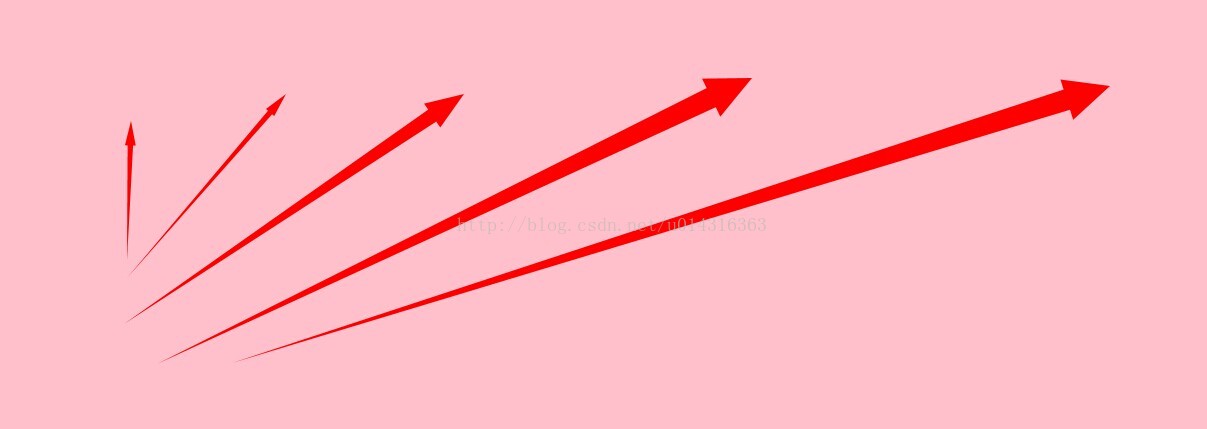canvas是HTML5的一个新添加的元素,HTML5 canvas是一个原生HTML绘图薄,用于Javascript代码,不使用第三方工具。
canvas部分方法列表:
| 方法 | 用途 |
|---|---|
getContext(contextId) |
公开在 canvas 上绘图需要的 API。惟一(当前)可用的 contextID 是 2d。 |
height |
设置 canvas 的高度。默认值是 150 像素。 |
width |
设置 canvas 的宽度。默认值是 300 像素。 |
createLinearGradient(x1,y1,x2,y2) |
创建一个线性渐变。起始坐标为 x1,y1,结束坐标为 x2,y2。 |
createRadialGradient(x1,y1,r1,x2,y2,r2) |
创建一个放射状渐变。圆圈的起始坐标是 x1,y1,半径为 r1。圆圈的结束坐标为 x2,y2,半径为 r2。 |
addColorStop(offset, color) |
向一个渐变添加一个颜色停止。颜色停止(color stop) 是渐变中颜色更改发生的位置。offset 必须介于 0 到 1 之间。 |
fillStyle |
设置用于填充一个区域的颜色 — 例如,fillStyle='rgb(255,0,0)'. |
strokeStyle |
设置用于绘制一根直线的颜色 — 例如,fillStyle='rgb(255,0,0)'. |
fillRect(x,y,w,h) |
填充一个定位于 x 和 y,宽度和高度分别为 w 和 h 的矩形。 |
strokeRect(x,y,w,h) |
绘制一个定位于 x 和 y,宽度和高度分别为 w 和 h 的矩形的轮廓。 |
moveTo(x,y) |
将绘图位置移动到坐标 x,y。 |
lineTo(x,y) |
从绘图方法结束的最后位置到 x,y 绘制一条直线。 |
下面为实现的canvas箭头源码:
drawarrow.js文件:
//polygonVertex存储模式: //polygonVertex[0,1]=beginPoint; //polygonVertex[2,3]=polygonVertex[triangle]右边坐标点 //polygonVertex[4,5]=三角形右边坐标 //polygonVertex[6,7]=三角形顶点坐标 stopPoint //polygonVertex[8,9]=三角形左边坐标 //polygonVertex[10,11]=polygonVertex[triangle]左边坐标点 $(document).ready(function() { var beginPoint = {}, stopPoint = {}, polygonVertex = [], CONST = { edgeLen: 50, angle: 25 }; //封装的作图对象 var Plot = { angle: "", //在CONST中定义的edgeLen以及angle参数 //短距离画箭头的时候会出现箭头头部过大,修改: dynArrowSize: function() { var x = stopPoint.x - beginPoint.x, y = stopPoint.y - beginPoint.y, length = Math.sqrt(Math.pow(x, 2) + Math.pow(y, 2)); if (length < 250) { CONST.edgeLen = CONST.edgeLen/2; CONST.angle = CONST.angle/2; } else if(length<500){ CONST.edgeLen=CONST.edgeLen*length/500; CONST.angle=CONST.angle*length/500; } // console.log(length); }, //getRadian 返回以起点与X轴之间的夹角角度值 getRadian: function(beginPoint, stopPoint) { Plot.angle = Math.atan2(stopPoint.y - beginPoint.y, stopPoint.x - beginPoint.x) / Math.PI * 180; console.log(Plot.angle); paraDef(50,25); Plot.dynArrowSize(); }, ///获得箭头底边两个点 arrowCoord: function(beginPoint, stopPoint) { polygonVertex[0] = beginPoint.x; polygonVertex[1] = beginPoint.y; polygonVertex[6] = stopPoint.x; polygonVertex[7] = stopPoint.y; Plot.getRadian(beginPoint, stopPoint); polygonVertex[8] = stopPoint.x - CONST.edgeLen * Math.cos(Math.PI / 180 * (Plot.angle + CONST.angle)); polygonVertex[9] = stopPoint.y - CONST.edgeLen * Math.sin(Math.PI / 180 * (Plot.angle + CONST.angle)); polygonVertex[4] = stopPoint.x - CONST.edgeLen * Math.cos(Math.PI / 180 * (Plot.angle - CONST.angle)); polygonVertex[5] = stopPoint.y - CONST.edgeLen * Math.sin(Math.PI / 180 * (Plot.angle - CONST.angle)); }, //获取另两个底边侧面点 sideCoord: function() { var midpoint = {}; // midpoint.x = polygonVertex[6] - (CONST.edgeLen * Math.cos(Plot.angle * Math.PI / 180)); // midpoint.y = polygonVertex[7] - (CONST.edgeLen * Math.sin(Plot.angle * Math.PI / 180)); midpoint.x=(polygonVertex[4]+polygonVertex[8])/2; midpoint.y=(polygonVertex[5]+polygonVertex[9])/2; polygonVertex[2] = (polygonVertex[4] + midpoint.x) / 2; polygonVertex[3] = (polygonVertex[5] + midpoint.y) / 2; polygonVertex[10] = (polygonVertex[8] + midpoint.x) / 2; polygonVertex[11] = (polygonVertex[9] + midpoint.y) / 2; }, //画箭头 drawArrow: function() { var ctx; ctx = $(".drawArrow")[0].getContext('2d'); ctx.fillStyle = "red"; ctx.beginPath(); ctx.moveTo(polygonVertex[0], polygonVertex[1]); ctx.lineTo(polygonVertex[2], polygonVertex[3]); ctx.lineTo(polygonVertex[4], polygonVertex[5]); ctx.lineTo(polygonVertex[6], polygonVertex[7]); ctx.lineTo(polygonVertex[8], polygonVertex[9]); ctx.lineTo(polygonVertex[10], polygonVertex[11]); // ctx.lineTo(polygonVertex[0], polygonVertex[1]); ctx.closePath(); ctx.fill(); } }; //记录起点beginPoint $(".drawArrow").mousedown(function(e) { beginPoint.x = e.pageX; beginPoint.y = e.pageY; // alert(beginPoint.x+"+"+beginPoint.y); }); //记录终点stopPoint,绘图 $(".drawArrow").mouseup(function(e) { stopPoint.x = e.pageX; stopPoint.y = e.pageY; // alert(stopPoint.x+"+"+stopPoint.y); Plot.arrowCoord(beginPoint, stopPoint); Plot.sideCoord(); Plot.drawArrow(); }); //自定义参数 function paraDef(edgeLen, angle) { CONST.edgeLen = edgeLen; CONST.angle = angle; } // $(".para-def").click(function() { // var edgeLen, // angle; // edgeLen = parseInt($(".edge-len").val()); // angle = parseInt($(".angle").val()); // paraDef(edgeLen, angle); // }); });
HTML文件:
<html> <head> <script type="text/javascript" src="jquery-2.0.3.min.js"></script> <script type="text/javascript" src="drawarrow.js"></script> <!-- <link rel="stylesheet" type="text/css" href="canvasArrow.css"> --> <meta charset="utf-8" name="canvasArrow"> </head> <style> .drawArrow { } </style> <body> <!-- <h2>Cavas箭头测试</h2> --> <canvas id="arrow" class="drawArrow" width="1400" height="600"> </canvas> </br> <label>EdgeLength <input type="text" class="edge-len"></input> </label> <label>Angle <input type="text" class="angle"></input> </label> <button class="para-def">定义参数</button> </body> </html>
效果图:
